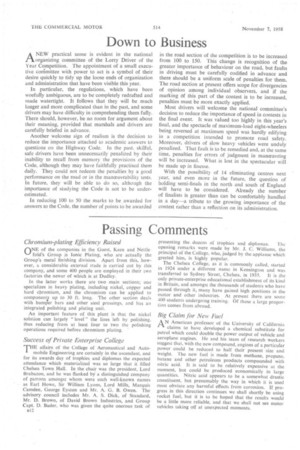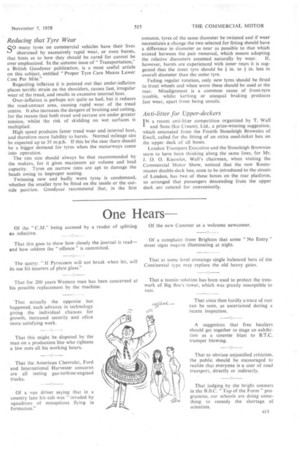Passing Comments
Page 46

Page 47

If you've noticed an error in this article please click here to report it so we can fix it.
Chromium-plating Efficiency Raised
nNE of the companies in the Guest, Keen and Nettle
fold's Group is Ionic Plating, who are actually the Group's metal finishing division. Apart from this, however, a considerable external trade is carried out by this company, and some 400 people are employed in their two factories the newer of which is at Dudley.
In the latter works there are two main sections; one specializes in heavy plating, including nickel, copper and hard chromium, and the chromium can be applied to component: up to 30 ft. long. The other section deals with bumper bars and other steel pressings, and has an integrated polishing and plating unit.
An important feature of this plant is that the nickel solution can largely " level" the lines left by polishing, thus reducing from at least four to two the polishing operations required before chromium plating. "
Success of Private Enterprise College
THE affairs of the College of Aeronautical and Auto
mobile Engineering are certainly in the ascendant, and for its awards day of trophies and diplomas the expected attendance which materialized was so large that it filled Chelsea Town Hall. In the chair was the president, Lord Brabazon, and he was flanked by a distinguished company of patrons amongst whom were such well-known names as Earl Howe, Sir William Lyons, Lord Mills, Marquis Camden, George Eyston and Mr. A. G. B. Owen. The advisory council includes Mr. A. S. Dick, of Standard, Mr. D. Brown, of David Brown Industries, and Group Capt. D. Bader, who was given the quite onerous task of
presenting the dozens of trophies and diplomas. The opening_ remarks were made by Mr. J. C. Williams, the principal of the College, who, judged by the applause which greeted him, is highly popular.
The Chelsea College, as it is commonly called, started in 1924 under a different name in Kensington and was transferred to Sydney Street, Chelsea, in 1935. It is the only private-enterprise educational establishment of its kind in Britain, and amongst the thousands of students who have passed through it, many have gained high positions in the motor and other industries. At present there are some 400 students undergoing training. Of those a large proportion comes from abroad.
Big Claim for New Fuel
A N American professor of the University of California " claims to have developed a chemical substitute for petrol which could double the power output of vehicle and aeroplane engines. He and his team of research workers suggest that, with the new compound, engines of a particular power could be reduced to half their present size and weight. The new fuel is made from methane, propane, butane and other petroleum products compounded with nitric acid. It is said to be relatively expensive at the moment, but could be produced economically in large quantities. Nitric acid appears to be a somewhat drastic constituent, but presumably the way in which it is used must obviate any harmful effects from corrosion. If progress in this direction continues we shall shortly be using rocket fuel, but it is to be hoped that the results would be a little more reliable, and that we shall not see motor vehicles taking off at unexpected moments.
Reducing that Tyre Wear
many tyres on commercial vehicles have their lives Li shortened by excessively rapid wear, or even bursts, that hints as to how they should be cared for cannot be over emphasized. In the autumn issue of " Transportation," a British Goodyear publication, is •a most useful article on this subject, entitled "Proper Tyre Care Means Lower Cost Per Mile."
Regarding inflation it is pointed out that under-inflation places terrific strain on the shoulders, causes fast, irregular wear of the tread, and results in excessive internal heat.
Over-inflation is perhaps not quite so bad, but it reduces the road-contact area, causing rapid wear of the tread centre. It also increases the dangers of bruising and cutting, for the reason that both tread and carcase are under greater tension,. whilst the risk of skidding on wet surfaces is multiplied.
High speed produces faster tread wear and internal heat, and therefore more liability to bursts. Normal mileage can be expected up to 35 m.p.h. If this be the case there should be a bigger demand for tyres when the motorways come into operation.
The rim size should always be that recommended by the makers, for it gives maximum air volume and load capacity. Tyres on narrow rims are apt to damage the beads owing to improper seating.
Twinning new and badly worn tyres is condemned, whether the smaller tyre be fitted on the inside or the outside position. Goodyear recommend that, in the first instance, tyres of the same diameter be twinned and if wear necessitates a change the two selected for fitting should have a difference in diameter as near as possible to that which existed between the pair removed, which means adopting
the relative diameters assumed naturally • by wear, if, however, bursts are experienced with inner rears it is suggested that the inner tyre should be -1 in. to f in. less in overall diameter than the outer tyre.
Failing regular rotation, only new tyres should be fitted to front wheels and when worn these should be used at the rear. Misalignment is a common cause of front-tyre trouble, whilst kerbing or unequal braking produces fast wear, apart from being unsafe.
Anti-litter for Upper-deckers
IN a recent anti-litter competition organized by T. Wall and Sons (Ice Cream), Ltd., a prize-winning suggestion, which emanated from the Fourth Stoneleigh Brownies of Ewell, called for the fitting of an extra used-ticket box on the upper deck of all buses.
London Transport Executive and the Stoneleigh Brownies seem to have been thinking along the same lines, for Mr. J. D. 0. Knowles, Wall's chairman, when visiting the Commercial Motor Show, noticed that the new Routemaster double-deck bus, soon to be introduced to the streets of London, has two of these boxes on the rear platform, so arranged that passengers descending from the upper deck are catered for conveniently.












































































































































